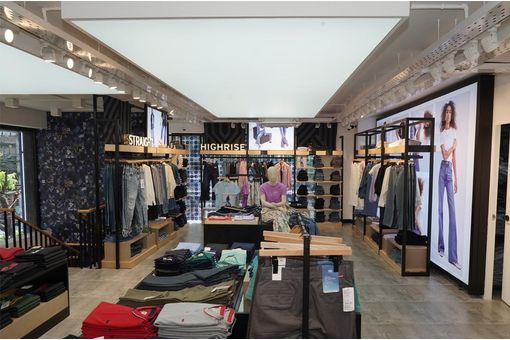Lenzing unveils latest Refibra breakthrough technology

Currently, Refibra technology feature the upcycling of a substantial proportion of pre-consumer cotton scraps from garment production and mixing with virgin wood pulp, to produce new Tencel lyocell fibres. In September 2019, Lenzing announced the first-phase of Refibra technology upgrade, by increasing the composition of pulp made from upcycled cotton scraps collected from garment manufacturing process to up to 30 per cent. In the second-phase, amongst the 30 per cent of recycled raw material content, Lenzing can incorporate up to 10 per cent of post-consumer cotton waste into the mixture of recycled materials alongside pre-consumer cotton waste. Tencel Lyocell fibres with Refibra technology are produced on demand and capacity can reach thousands of tons for both generations.
“Our world’s forests and climate need these kinds of next generation solutions at both scale and speed in the cellulosic fibre sector. Canopy applauds Lenzing for the vision of making textile waste recycling common place and for launching this commercially available product line with the first steps of post-consumer recycled content,” said Nicole Rycroft, executive director of Canopy. “We look forward to Lenzing’s leadership as they work to significantly increase the volume of their raw material that comes from next generation feed-stocks, and we know brands and retailers are looking to preference producers who hit the goal of a 50 per cent post-consumer recycled fibre line first.”
With growing interest around the concept of ‘circular economy’ across the globe, the scaled production of Tencel lyocell fibres using post-consumer cotton waste is a key milestone for Lenzing’s pursuit to build a fully sustainable textile ecosystem. The second phase upgrade of Refibra technology poses tremendous business opportunities and helps drive greater developments for circular economy. Lenzing believe that the growing adoption of recycled textiles is an essential part of the fibre industry’s future growth strategy. Such frontier production model can help revolutionise the fashion industry and empower brands who are looking for eco-responsible textile value chains. It is the vision of Lenzing to make textile waste recycling a common process like paper recycling.
“Being able to use discarded garments consisting of a wider range of materials will greatly enlarge the raw material basis for textile recycling. This innovation is a groundbreaking step towards tackling the global issue of textile waste disposal. At the same time it reduces the extraction of wood as a raw material and relieves the pressure on global forest ecosystems. Our vision includes recycling of fabrics and garments from Lenzing’s own materials. Lenzing is the first producer of wood-based cellulosic fibres offering Global Recycling Standard (GRS) and the Recycled Claim Standard (RCS) offering perfect transparency for the materials used during production.
Produced in eco-responsible closed-loop production process, fibres produced using Refibra technology are 100 per cent bio-based. The fibres will also feature properties of enhanced breathability through good moisture management, silky smoothness and strength.
By leveraging such innovative breakthrough, Lenzing has been working closely with brands and industry stakeholders to pursue a more collaborative driving force for the transition towards greater inclusive and circular economic growth.
“For several years, we have witnessed a rise of eco-consciousness amongst consumers. Consumers have been demanding more sustainable product options in their shopping list. If a company wants to truly improve its sustainability practice, it needs to re-examine its current business model and consider introducing new products or technologies with recyclability and reusability in mind. At Lenzing, sustainability is part of our DNA, and we will continue to stand at the industry forefront to assist businesses with the implementation of eco-practices in their operations,” said Florian Heubrandner, vice president of global business management textiles of Lenzing.
Tencel is the textile specialty brand under The Lenzing Group that covers textile specialty product fibre offerings for apparel and home. The Tencel product brand portfolio defines a new evolutionary step in terms of sustainability, functional benefits, natural comfort and caters for distinctive everyday usage or application. Product brands under Tencel includes Tencel Active, Tencel Denim, Tencel Home, Tencel Intimate, Tencel Luxe and Tencel for Footwear.
Featuring botanic origin and biodegradable quality, Tencel modal and Tencel lyocell fibres can enhance breathability of fabrics and have minimal static charge when used in fabrics. Fabrics made of Tencel modal and lyocell fibres are also gentle on skin with smooth, long-lasting softness, colour vibrancy and colour retention features. Tencel lyocell fibres are versatile and can be combined with a wide range of textile fibres to enhance the aesthetics and functionality of fabrics. Through moisture management, Tencel lyocell fibres can also absorb moisture efficiently. Exhibiting high flexibility, Tencel modal fibres enhance textiles with a naturally soft quality. Offering endless design possibilities, Tencel modal fibres can be blended with other fibres and processed using conventional machinery, significantly improving the softness and comfort of fabrics.
Fibres used under the Tencel brand are derived from certified and controlled sources following the stringent guidelines of the Lenzing Wood and Pulp Policy. Namely Tencel modal and Tencel lyocell fibres, both cellulosic fibres are produced via environmentally responsible production processes and are compostable and biodegradable, thus can fully revert back to nature. Tencel modal and tencel lyocell fibres are designated by the US Department of Agriculture (USDA) BioPreferred Program.
The Lenzing Group stands for ecologically responsible production of specialty fibres made from the renewable raw material wood. As an innovation leader, Lenzing is a partner of global textile and nonwoven manufacturers and drives many new technological developments.
Fibre2Fashion News Desk (PC)
































-Ltd..jpg?tr=w-120,h-60,c-at_max,cm-pad_resize,bg-ffffff)





.jpg?tr=w-120,h-60,c-at_max,cm-pad_resize,bg-ffffff)
.jpg?tr=w-120,h-60,c-at_max,cm-pad_resize,bg-ffffff)






